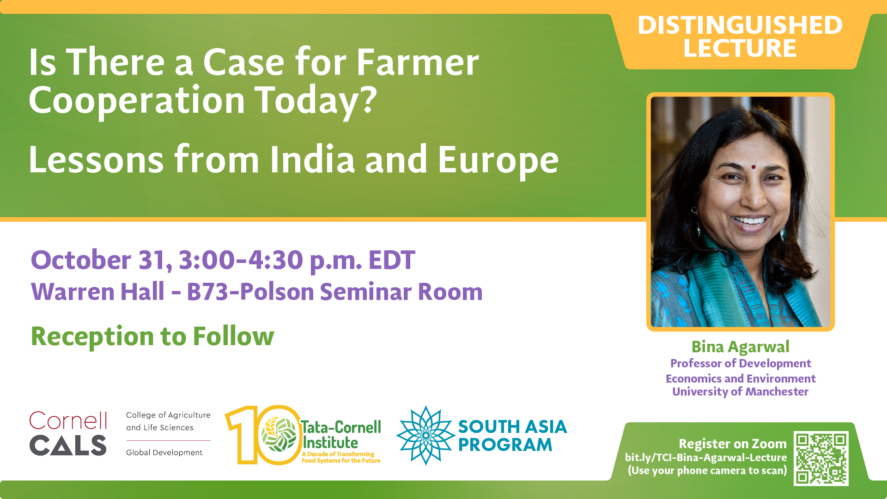Development Economist Bina Agarwal to Deliver Lecture on Farmer Cooperation

UPDATED NOV. 14, 2023: A recording of Bina Agarwal’s lecture is now available on YouTube:
Bina Agarwal, professor of development economics and environment at the University of Manchester’s Global Development Institute, will deliver a distinguished lecture at Cornell University on Tuesday, October 31, from 3-4:40 p.m. EDT in Warren Hall B73. The lecture is titled, “Is There a Case for Farmer Cooperation Today? Lessons from India and Europe.”
The event will be held in a hybrid format. Virtual participants can register to attend via Zoom. A reception with refreshments will follow the lecture.
Agarwal’s research contributions include both theory and empirical analysis, with a particular focus on society’s most disadvantaged. She writes from the perspective of political economy and gender on diverse but interconnected subjects, such as property, land rights, and livelihoods; environmental governance, sustainable development, and collective action; agriculture, technology, and food security; poverty and institutional transformation; legal change; and intersecting inequalities. Her publications include 13 books (authored and edited) and 86 academic papers.
Agarwal’s pioneering work on gender inequality in property and land, as well as on environmental issues, has had a global impact. Among her best-known works is A Field of One’s Own: Gender and Land Rights in South Asia, which in 1996 was awarded the A.K. Coomaraswamy Book Prize, the Edgar Graham Book Prize, and the K. H. Batheja Award. Her work placed the issue of women’s land rights on the agenda of governments, civil society groups, and international agencies, and the issue is now included in the UN Sustainable Development Goals.
In her 2010 book, Gender and Green Governance, Agarwal explored the impact of women’s presence on forest governance and conservation, empirically demonstrating positive outcomes on both counts. In 2016, Oxford University Press published a three-volume compendium of her selected papers, entitled Gender Challenges.
As a policy advocate, Agarwal brings insights from both theory and field experience to her work. In 2005, she spearheaded a successful civil society campaign for the amendment of the Hindui Inheritance law in India to make it gender equal. She frequently writes on policy matters for India’s leading newspapers.
Educated at the Universities of Cambridge and Delhi, Agarwal has held distinguished teaching and research positions at many universities, including Cambridge, Harvard, Princeton, Michigan, Minnesota, and the New York University School of Law. She was Harvard’s first Daniel Ingalls Visiting Professor and later a research fellow at the Kennedy School of Government’s Ash Institute. She has also been a fellow of Radcliffe’s Bunting Institute at Harvard. She continues to be affiliated with the Institute of Economic Growth at Delhi University, where she was earlier director and professor of economics.
Agarwal was previously the president of the International Society for Ecological Economics, vice president of the International Economic Association, and president of the International Association for Feminist Economics. She has served on the Boards of many international organizations, including the Global Development Network, UNRISD, the UN Committee for Development Policy, and the Future Earth Science Committee. She is currently a member of the International Panel of Experts on Sustainable Food Systems (IPES-Food), and on the editorial boards of many academic journals. In 2016, she was elected as an international member of the prestigious Accademia dei Lincei, Italy. She also holds honorary doctorates from the Institute of Social Studies in the Netherlands and the University of Antwerp in Belgium.
Agarwal has received many honors for her work. In 2002, she received the Malcolm Adiseshiah award for “Distinguished Contributions to Development Studies,” and in 2005 she received the Ramesh Chandra award for “Outstanding Contributions to Agricultural Economics.” In 2008, she was honored by the president of India with a Padma Shri for her contributions to education. In 2010, she received the Leontief Prize from Tufts University “for advancing the frontiers of economic thought.” She was awarded the Order of Agricultural Merit (officer) by the Government of France in 2016. In 2017 she received the Agropolis Louis Malassis International Scientific Prize for an “Outstanding Career in Agricultural Development,” as well as the prestigious International Balzan Prize for “challenging established premises in economics and the social sciences by using an innovative gender perspective; and for opening new intellectual and political pathways in key areas of gender and development.”
Agarwal’s lecture is sponsored and organized by the Tata-Cornell Institute for Agriculture and Nutrition (TCI), with co-sponsorship by the Department of Global Development and South Asia Program.

